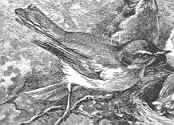===========================
January 18, 2003 (Gregorian Lunar Almanac 2003, 1st Moon, 15th day)
Court to Public: "We lied, suckers!"
In its ruling in Eldred v. Ashcroft, the U.S. Supreme Court has said, in effect: "We lied, suckers. Almost everything we ever said about the public purposes of copyright was just hot air."
I am amazed that the court showed disregard, not only of its own copyright jurisprudence, but of its own institutional self-interest. The court could easily have remanded the case for a trial on the question of whether the Bono Act promotes progress more than it places monopoly burdens on the public (copyright clause balancing) or on the question of whether it promotes a significant government interest more than it burdens speech (first amendment balancing). The lower courts would have gone through the motions of making this evaluation and upheld the Act. Eldred would have appealed again, the Supreme Court would have denied certiorari the second time, and that would have been the end of Eldred's case. But the court would have been more consistent with its existing copyright jurisprudence, and at the same time would more strongly have upheld their prerogatives of constitutional review of Congress's exercise of its limited powers. It will be hard for future courts to strike down any future extensions of the copyright term without repudiating its decision in Eldred's case.
The Eldred opinion's ignorance, or cynical dismissal, of its earlier jurisprudence is made especially clear in footnote 18:
Justice Stevens' characterization of reward to the author as "a secondary consideration" of copyright law...understates the relationship between such rewards and the "Progresss of Science". As we have explained, [t]he economic philosophy behind the [Copyright [C]lause...is the conviction that encouragement of individual effort by personal gain is the best way to advance public welfare through the talents of authors and inventers." Mazer v. Stein, 347 U.S. 201, 219 (1954). Accordingly, "copyright law celebrates the profit motive, recognizing that the incentive to profit from the exploitation of copyrights will redound to the public benefit by resulting in the proliferation of knowledge...The profit motive is the engine that ensures the progress of science." American Geophysical Union v. Texaco Inc. 802 F. Supp. 1, 27 (SDNY 1992), aff'd, 60 F. 3d 913 (CA2 1994). Rewarding authors for their creative labor and "promot[ing]...Progress" are thus complementary; as James Madison observed, in copyright "[t]he public good fully coincides...with the claims of individuals." The Federalist No. 43...Justice Breyer's assertion that "copyright statutes must serve public, not private ends"...similarly misses the mark. The two ends are not mutually exclusive; copyright law serves public ends by providing individuals with incentive to pursue private ones.
In Madison's day it might have been possible to assert that the public good "fully coincid[ed] with the claims of individuals", because the scope of copyright did not then include derivative works; did not then include public displays and performances; and only lasted for 28 years at most. Everything else Madison wrote about copyrights and patents shows that he is fully aware that copyright places burdens on the public, and that these burdens can, if they become heavy enough, destroy the coincidence between "the public good" and "the claims of individuals." Justice Stevens's and Justice Breyer's statements are entirely consistent with the cases they site. It is the court majority that "misses the mark", disregarding the clear spirit of the court's earlier copyright dicta and cynically citing Madison in a tendentious way. Justice Stevens does not "understate the relationship between [the] rewards [conferred in the copyright monopoly] and the 'Progress of Science'". It is the court majority that understates --indeed, all but ignores -- the relationship between the public domain and the "Progress of Science."
The effect of the Eldred ruling is that the Congress need never rationally weigh the burdens copyright places on the public. The Constitution clearly presupposes that the expiration of copyright--the public domain, as we now call it--is the most important constitutional means of keeping copyright true to its purpose of promoting progress. But though the Constitution gives the public domain pride of place in its text through the words "promote progress", "for authors", and "limited times", the court has stated that the 105th Congress's cynical dismissal of the public domain as worthless is not subject to constitutional review.
The court's rubber-stamp review of the Copyright Term Extension Act is the weakest standard of judical review ever proposed. It is weaker even than the generous standard stated in McCullogh v. Maryland (17 U.S. 316), where Mr. Chief Justice Marshall declared that an act of Congress must be "plainly adapted" to their constitutional ends and "consist with the spirit" of the Constitution. Courts are understandably reluctant to invalidate acts of Congrss for failing to comply with the spirit of the constitution. But if any act of Congress fails to "consist with the spirit" of the article I power under which it is passed, it is the Bono Act.
The court then backpedals with the following bit of Pilatesque hand-washing:
The wisdom of Congress' action...is not within our province to second guess.
But as Mr. Justice Breyer pointed out in different words in his dissent, a want of reason in the legislative judgement is grounds for finding an act of Congress invalid. An act that is unwise is by definition an act of folly; and folly must at some point rise to the level of the constitutionally unreasonable. A fair court would at least have considered seriously the burdens that the CTEA places on the public. One of the reasons I find the Eldred ruling is defective is that it scarcely even to acknowledges the existence of these burdens, much less their great weight.





